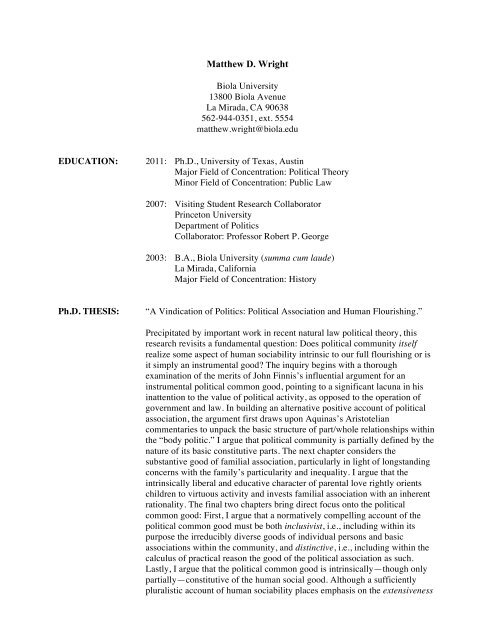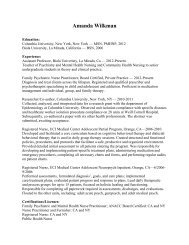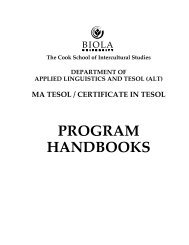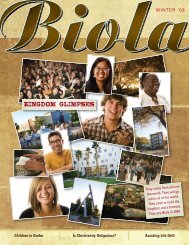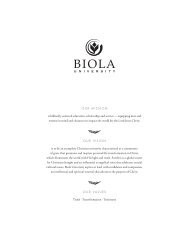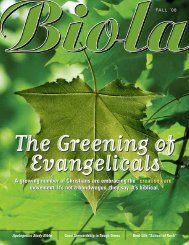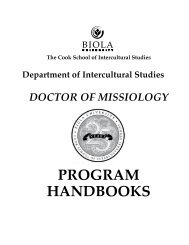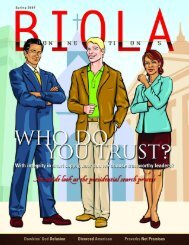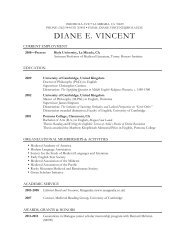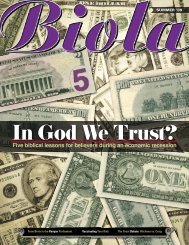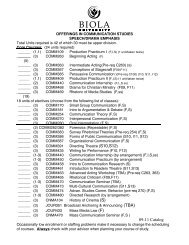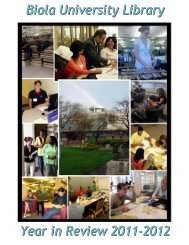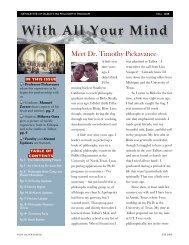MD Wright Torrey CV Revised 5-28-2013 - Biola University
MD Wright Torrey CV Revised 5-28-2013 - Biola University
MD Wright Torrey CV Revised 5-28-2013 - Biola University
Create successful ePaper yourself
Turn your PDF publications into a flip-book with our unique Google optimized e-Paper software.
Matthew D. <strong>Wright</strong><br />
<strong>Biola</strong> <strong>University</strong><br />
13800 <strong>Biola</strong> Avenue<br />
La Mirada, CA 90638<br />
562-944-0351, ext. 5554<br />
matthew.wright@biola.edu<br />
EDUCATION: 2011: Ph.D., <strong>University</strong> of Texas, Austin<br />
Major Field of Concentration: Political Theory<br />
Minor Field of Concentration: Public Law<br />
2007: Visiting Student Research Collaborator<br />
Princeton <strong>University</strong><br />
Department of Politics<br />
Collaborator: Professor Robert P. George<br />
2003: B.A., <strong>Biola</strong> <strong>University</strong> (summa cum laude)<br />
La Mirada, California<br />
Major Field of Concentration: History<br />
Ph.D. THESIS: “A Vindication of Politics: Political Association and Human Flourishing.”<br />
Precipitated by important work in recent natural law political theory, this<br />
research revisits a fundamental question: Does political community itself<br />
realize some aspect of human sociability intrinsic to our full flourishing or is<br />
it simply an instrumental good? The inquiry begins with a thorough<br />
examination of the merits of John Finnis’s influential argument for an<br />
instrumental political common good, pointing to a significant lacuna in his<br />
inattention to the value of political activity, as opposed to the operation of<br />
government and law. In building an alternative positive account of political<br />
association, the argument first draws upon Aquinas’s Aristotelian<br />
commentaries to unpack the basic structure of part/whole relationships within<br />
the “body politic.” I argue that political community is partially defined by the<br />
nature of its basic constitutive parts. The next chapter considers the<br />
substantive good of familial association, particularly in light of longstanding<br />
concerns with the family’s particularity and inequality. I argue that the<br />
intrinsically liberal and educative character of parental love rightly orients<br />
children to virtuous activity and invests familial association with an inherent<br />
rationality. The final two chapters bring direct focus onto the political<br />
common good: First, I argue that a normatively compelling account of the<br />
political common good must be both inclusivist, i.e., including within its<br />
purpose the irreducibly diverse goods of individual persons and basic<br />
associations within the community, and distinctive, i.e., including within the<br />
calculus of practical reason the good of the political association as such.<br />
Lastly, I argue that the political common good is intrinsically—though only<br />
partially—constitutive of the human social good. Although a sufficiently<br />
pluralistic account of human sociability places emphasis on the extensiveness
of the political good over the superiority of political activity per se, there are<br />
essential human virtues—justice, love, generosity—that are uniquely (if not<br />
exclusively) fostered in political community and potentially realized in civic<br />
friendship.<br />
Director: Professor J. Budziszewski<br />
EXPERIENCE: Assistant Professor of Government, 2012 – present<br />
<strong>Torrey</strong> Honors Institute, <strong>Biola</strong> <strong>University</strong> - La Mirada, CA<br />
• History and Development of Political Theory<br />
• Plato’s Republic<br />
• Augustine’s City of God<br />
• Thomas Aquinas’ Summa Theologica<br />
• John Locke’s Second Treatise of Civil Government<br />
Visiting Assistant Professor of Government, 2011-2012<br />
School of Public Affairs, Morehead State <strong>University</strong> – Morehead, KY<br />
• Philosophy of the Social Sciences<br />
• American Government<br />
• Jurisprudence<br />
Assistant Instructor / Teaching Assistant, 2004-2011<br />
Department of Government, <strong>University</strong> of Texas, Austin<br />
• The American Constitutional Identity<br />
• The Constitutional Debates<br />
• Might and Right Among Nations<br />
• Constitutional Interpretation<br />
TEACHING INTERESTS: Great books of the Western tradition; statesmanship, the rule of law,<br />
and the common good; civil society and political order; history of<br />
political thought; contemporary political thought; patriotism and<br />
international order; American constitutional law and development; civil<br />
liberties; comparative constitutionalism; constitutional theory;<br />
jurisprudence.<br />
REFEREED ARTICLES – BOOK CHAPTERS:<br />
“Natural Law, Civic Friendship, and Stanley Hauerwas’s Counter-Polis Thesis,” in Natural Law<br />
and Evangelical Political Thought (Lexington Books, <strong>2013</strong>), 225-249.<br />
“The Aim of Law and the Nature of Political Community: An Assessment of Finnis on Aquinas,”<br />
American Journal of Jurisprudence 54 (2009): 133-160.<br />
2
OTHER PUBLICATIONS:<br />
“Getting Dignity Right,” published in the web magazine Public Discourse, August 17, 2012<br />
(http://www.thepublicdiscourse.com/2012/08/5973/)<br />
“The Changing Idea of a <strong>University</strong>: American Higher Education and the Illiberal Use of<br />
Knowledge.” www.acton.org/programs/students/essay/2001/hmention2.html (published<br />
2001)<br />
“Prepared to Lead: A Defense of Liberal Education,” Symposium (publication of the <strong>Torrey</strong><br />
Honors Institute) 2, no. 3 (2002): 1-2.<br />
“Seeking the Greater Good,” Symposium 1, no. 4 (2001): 5.<br />
PAPERS GIVEN: “Civic Friendship as the Substantive Political Good,” presented at the Annual<br />
Meeting of the Southwestern Political Science Association, New Orleans,<br />
Louisiana, March 27-30, <strong>2013</strong>.<br />
“The Common Good, Civic Friendship, and Political Authority,” presented at the<br />
Annual Meeting of the American Political Science Association, New Orleans,<br />
Louisiana, August 30-September 2, 2012.<br />
“Material and Special Parts in Aquinas’s Understanding of the Body Politic,”<br />
presented at the annual meeting of the Southern Political Science Association,<br />
New Orleans, Louisiana, January 12-14, 2012.<br />
Discussant for panel, “Theories of Moral and Political Obligation” at the annual<br />
meeting of the Southern Political Science Association, New Orleans, Louisiana,<br />
January 12-14, 2012.<br />
“Formal Properties of the Political Common Good,” presented at the annual<br />
meeting of the Midwest Political Science Association, Chicago, Illinois, March<br />
31-April 3, 2011.<br />
“Disentangling the Social and the Political in Thomistic Political Thought,”<br />
presented at the annual meeting of the Midwest Political Science Association,<br />
Chicago, Illinois, April 2009.<br />
“The Roles of Family and State in the Moral Education of Children,” presented at<br />
the annual conference of the Notre Dame Center for Ethics and Culture, The<br />
Family: Searching for Fairest Love, South Bend, Indiana, November 6-8, 2008.<br />
“Thomas Aquinas, John Finnis, and the Distinction between Public and Private,”<br />
presented at the Annual Meeting of the Midwest Political Science Association,<br />
Chicago, Illinois, April 2008. Also presented for the Graduate Research<br />
Colloquium, Department of Government, <strong>University</strong> of Texas, Austin, April<br />
2008.<br />
“A Comparison of Hobbes and Spinoza on Human Nature, the State of Nature,<br />
and the Social Contract,” presented at the Annual Meeting of the Southwestern<br />
Political Science Association, San Antonio, Texas, April 2006.<br />
“Pursuing the Ends of Government: The Political Theory and Context of the<br />
Federalist Papers,” presented at the <strong>Torrey</strong> Honors Institute, <strong>Biola</strong> <strong>University</strong>,<br />
Spring 2004.<br />
3
“The Imaginative Power of the Right to Property in the Formation of the<br />
American Republic,” presented at the Phi Alpha Theta Regional Conference,<br />
California State <strong>University</strong>, San Marcos, April 2003.<br />
“The Investiture Controversy and the Papal Conception of Power,” presented at<br />
the Phi Alpha Theta Regional Conference, Loyola Marymount <strong>University</strong>, April<br />
2002.<br />
LECTURES: “Natural Law and the Tao: What Stands Behind Lewis,” <strong>Torrey</strong> Honors<br />
Institute, April 17, <strong>2013</strong>.<br />
GRANTS / FELLOWSHIPS:<br />
Faculty<br />
“The Federalists and Their Opponents,” <strong>Torrey</strong> Honors Institute, November<br />
1, 2012.<br />
“The Key to Locke,” <strong>Torrey</strong> Honors Institute, October 23, 2012.<br />
“Natural Law and Natural Rights,” Philosophy Club, Morehead State<br />
<strong>University</strong>, April 12, 2012.<br />
Lecture Series Grant, <strong>2013</strong>-2014. Charles Koch Foundation, Arlington, Virginia.<br />
($7,000)<br />
Summer Research Grant, <strong>2013</strong>. The Earhart Foundation, Ann Arbor, Michigan.<br />
($14,250)<br />
Fellowship, Jack Miller Summer Institute, co-sponsored by the Jack Miller Center and<br />
the <strong>University</strong> of Virginia’s Program on Constitutionalism and Democracy, the<br />
<strong>University</strong> of Virginia, June 11-22, 2012. Theme: Citizenship and the American<br />
Republic. ($2,700 + all expenses)<br />
Graduate<br />
Fellowship, American Studies Center Summer Institute, co-sponsored by the<br />
Intercollegiate Studies Institute and Princeton <strong>University</strong>’s James Madison Program<br />
in American Ideals and Institutions, Princeton <strong>University</strong>, June 13-25, 2011. Theme:<br />
The Constitution and American Identity. ($1,000 + all expenses)<br />
Malcom MacDonald Summer Research Fellowship. 2011, 2009. Department of<br />
Government, <strong>University</strong> of Texas, Austin. ($5,000 each)<br />
Joe R. Long Dissertation Fellowship. 2010. Department of Government, <strong>University</strong> of<br />
Texas, Austin. ($7,500)<br />
Western Civilization Fellowship. 2008-2009. Intercollegiate Studies Institute,<br />
Wilmington, Delaware. ($20,000)<br />
Graduate Dean Prestigious Fellowship Supplement. 2008-2009. Graduate School,<br />
<strong>University</strong> of Texas, Austin.<br />
Professional Development Award. 2008, 2009. Office of Graduate Studies, <strong>University</strong><br />
of Texas, Austin.<br />
4
H.B. Earhart Fellowship. 2006-2007. Earhart Foundation, Ann Arbor, Michigan.<br />
($17,500 + tuition)<br />
Calihan Research Fellowship. 2006, 2010. Acton Institute, Grand Rapids, Michigan.<br />
PROFESSIONAL ACTIVITY:<br />
WORKSHOPS:<br />
Research Proposal Referee, Fall 2012, Earhart Foundation, Ann Arbor, Michigan.<br />
Committee Member, Political Science Faculty Search, 2012-<strong>2013</strong>, School of Arts and<br />
Sciences, <strong>Biola</strong> <strong>University</strong>.<br />
Participant, “Marriage and the Social Sciences,” The Witherspoon Institute, Princeton, NJ,<br />
June 9-12, 2010.<br />
Participant, “Tyranny and the Defense of Liberty,” Intercollegiate Studies Institute / Liberty<br />
Fund, Omaha, NE, April 22—25, 2010.<br />
Participant, “Liberty, Commerce, and Character in Hume’s Essays,” Intercollegiate Studies<br />
Institute / Liberty Fund, Mecosta, MI, August 21-24, 2008.<br />
Participant, First Principles Seminar: “Natural Law Theory and Political Liberalism: John<br />
Finnis and John Rawls,” The Witherspoon Institute, Princeton, NJ, August 5-16, 2006.<br />
Participant, First Principles Seminar: “Natural Law Theory: The Old versus the New,” The<br />
Witherspoon Institute, Princeton, NJ, August 8-19, 2005.<br />
PROFESSIONAL American Political Science Association<br />
ASSOCIATIONS: Southwestern Political Science Association<br />
American Society for Political and Legal Philosophy<br />
5


